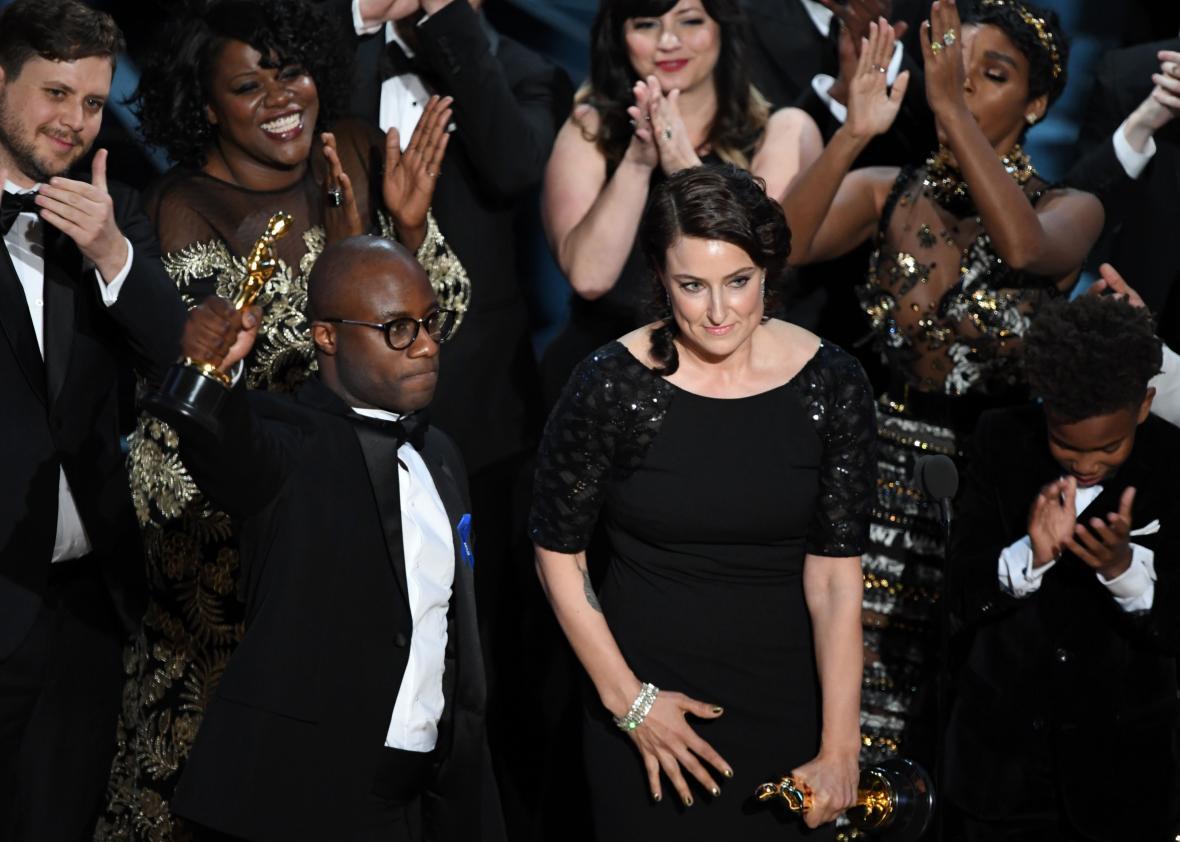Before Sunday night’s Oscars had even begun, there was a sense that the show would be predictable: lots of fiery political speeches paired with a sweep by La La Land, the apolitical homage to Technicolor Hollywood musicals. Well, that’s why you actually have to watch the damn show.
The 89th Academy Awards did not play out as expected: Instead of being an explicit rebuke of Donald Trump, full of Meryl Streep–style barn burners, the show was an implicit but relatively quiet rebuke of Donald Trump until the wacky, wild ending, in which La La Land appeared to have won Best Picture, only to have lost Best Picture to Moonlight. Sorry to all the tourists who rolled up to the Academy Awards in a tour bus: Your 15 minutes of fame lasted exactly until whatever happened with Warren Beatty and that envelope. Instead of being what, for nearly four hours, this broadcast seemed to be—a low-key celebration of Muslim, foreign, and black talent capped by a predictable win for a sexual harasser and a message-free box office juggernaut—the Academy Awards suddenly became the fantasy metaphor so many liberals have been longing for. (Whether La La Land was unfairly cast in that fantasy metaphor is a question for another, clearer-headed time.)
The producers of the Oscars, rather than the winners of the Oscars, seemed to be expecting an openly provocative show. Despite starting with Justin Timberlake’s performance of “Can’t Stop the Feeling,” an enticement to an escapist good time, host Jimmy Kimmel’s monologue took shots at Trump, including “I want to say thank you to President Trump: I mean, last year, remember when it seemed like the Oscars were racist?” It wasn’t just the monologue. Later in the evening, Kimmel tweeted at Trump, “u up?” and #Merylsayshi. There was a lengthy montage of foreign moviegoers talking about their favorite American films. Even the most ambitious bit of the evening, in which a busload of tourists was given a surprise trip to the Oscars, seemed to be in direct, if confused, conversation with the notion that Hollywood is out of touch with regular people. The bit was overly long and awkward, but it was perhaps intended as a rejoinder emphasizing that regular folks are, instead, pretty enamored with Hollywood (or at least Denzel Washington).
But the winners had other, mellower ideas, mounting a slow and inexorable assault on Trump’s vision of America without talking too much about him at all. Mahershala Ali, who won the first Oscar of the night, is the first Muslim actor ever to win an Academy Award. Later in the evening, the winner for the Best Documentary short, about the White Helmets, quoted a verse from the Quran.* The most political speech of the night belonged to Iranian filmmaker Asghar Farhadi, who won Best Foreign Film for The Salesman and didn’t attend because of the travel ban on his country. His eloquent statement, read in absentia, included the observation that “Dividing the world into the ‘us’ and ‘our enemies’ categories creates fear.” Meanwhile, in other Oscar categories, Italians, a Frenchman, Hungarians, and a Swede won awards. Viola Davis won for Best Supporting Actress and Ezra Edelman’s O.J.: Made in America won for Best Documentary—so that by the time Barry Jenkins and Tarrell Alvin McCraney won for Best Adapted Screenplay, the Oscars had set a record: “the first to feature more than three black winners.” The cumulative effect was a show that was deeply anti-Trump, without being all that vocally or entertainingly anti-Trump.
By the time La La Land was announced as Best Picture winner, the night seemed to be a tepid rejoinder to Trump, if a substantive response to #OscarsSoWhite—and even still, there was Casey Affleck beating out Denzel Washington in the midst of a seeming La La Land sweep. The evening’s most interesting moment wasn’t some controversial speech that liberals could love and be embarrassed by and that conservatives could hate and torture us with. At that point, the “highlights,” if you can call them that, of the show included the bus bit, Kimmel’s habitual running-down of Matt Damon, and the Oscars’ now-annual attempt to feed famous people. (Why has this become a trope? Stars, they eat food? Stars, they’re just like us—they eat candy rained down upon them at the Academy Awards in little parachutes?)
Why had the broadcast been so apolitical up to this point? Were the winners and presenters skittish about saying much at the Oscars, a much bigger show than the far more political Globes and Screen Actors Guild Awards? (At the Independent Spirit Awards, which took place just the night before the Oscars, Casey Affleck gave an anti-Trump speech, while doing no such thing when he won tonight.) Were they expecting others to do it, except only Gael García Bernal actually did? Does the Oscars’ unique structure, in which the majority of awards are given to low-profile winners, play a part? Whatever the reason, Barry Jenkins’ remarks during his Best Adapted Screenplay speech—“and all you people out there who think there’s no mirror for you, that your life is not reflected, the academy has your back. The ACLU has your back. We have your back. And for the next four years, we will not leave you alone. We will not forget.”—were the high-water mark of resistance, beside the Farhadi speech.
But then, the ceremony running more than half an hour over, La La Land was announced Best Picture, seemingly crowning a dull night, but, in fact, inaugurating a crazy one. The ending of the show completely overshadowed everything that came before it, even as it undermined any coherent sense of trajectory. Moonlight didn’t get to revel in its victory so much as deal with the weirdness of the circumstances—but those circumstances were so much more abundantly theatrical than everything that had come before.
*Correction, Feb. 27, 2017: This post originally misstated that winner of the Oscar for Best Documentary Short was about “the White Hats.” It’s about the White Helmets.
